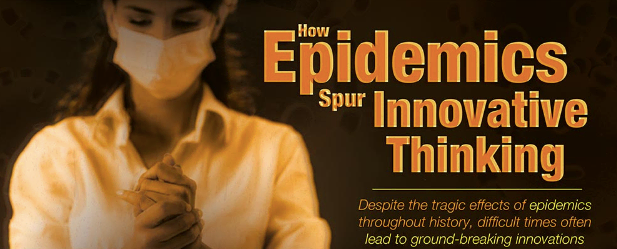Quarantine Isn’t So Bad: Epidemics Spur Innovative Thinking

There are pros and cons to every situation. Atypical to most COVID-19 coverage, I’m going to explain the societal advancements an epidemic can guide us toward achieving.
For example: did you know Isaac Newton created Calculus while quarantining himself from The Black Death?
Historically, epidemics have taught us to teach ourselves. In other words, the immense alone time we spend in efforts of dodging viral illness can lead us to unlock the inner-creativity we’re generally distracted from. Although controversial, without previous epidemics, we may not have reached the level of societal development we see today. This is because crises encourage us to push forward: mentally, and as a species.
However, times are much different than those of past epidemics. Unlike the eras of the AIDs outbreak, Spanish Flu, Boston Smallpox, and the Bubonic Plague, we essentially live in two dimensions: reality and digital. In earlier civilizations, it was instinctual for dwellers to quarantine themselves upon the outbreak of a virus. Today, not so much.
Why are we so slow to react in life or death situations? Perhaps because we have distance learning and remote work to fall back on. Still, this doesn’t equate to invincibility.
We are the first in history to experience pandemia in this manner – being forced to stay home rather than wanting to stay home. I encourage you to dig within yourself during your extended isolation. Perfect your distance learning techniques, and let your brain roam. We’re most creative when we let our brains wander. Who knows what can come of this quarantine.
Here are some examples of how past epidemics have impacted the course of civilization:
The Black Death (mid-1300s)
- Changed the economic & social structure of Europe
- Led to the creation of the Middle Class
- Sparked interest in literacy, art, and experimentation
- Led Shakespeare to turn to poetry for income after theaters closed. Venus and Adonis, The Rape of Lucrece, King Lear, Macbeth, and Antony & Cleopatra are still studied today
- Influenced Newton’s development of Calculus, Optics, Laws of Motion, & Gravity
The Boston Smallpox Epidemic (1721)
- Contributed to the first step towards vaccines
- Led to the spread of variolation
- Led to the creation of the first independent newspaper in the U.S.
The Spanish Flu (1918)
- Was the first time public health began investigating the root causes of illnesses such as diet and living condition
- By 1925: Every U.S. state began reporting national diseases in a new manner
- By 1935: The U.S. deployed its first national health survey
- By 1945: The first effective flu vaccine was discovered
Our biggest global issues concerning COVID-19 lie within ventilator accessibility, controlling the rate of spread, and providing protective equipment. Although many developments have been made in efforts to cater to the aforementioned obstacles – are they situational or will they prove to be futuristically applicable?
I’m sure you’ve heard “our children are our future,” time and time again. Whether you’re a distance learner yourself, a parent of an eLearner, or an educator providing content to our students – the time is now. We all have the potential to change the world in a manner where our innovations are valuable to not only just us but to all mankind. What it takes is tapping into your inner-self, and quarantining provides you with a long-term opportunity to do just that.
The infographic below outlines historical epidemics that have broken out across the globe. Here’s how epidemics spur innovative thinking. Take care, and stay safe.













Responses